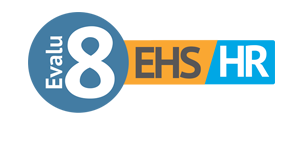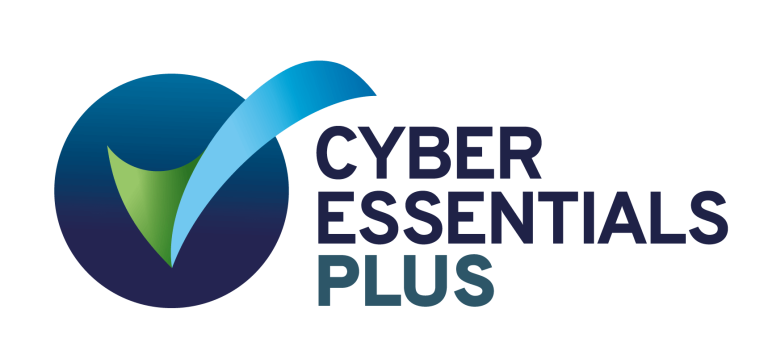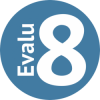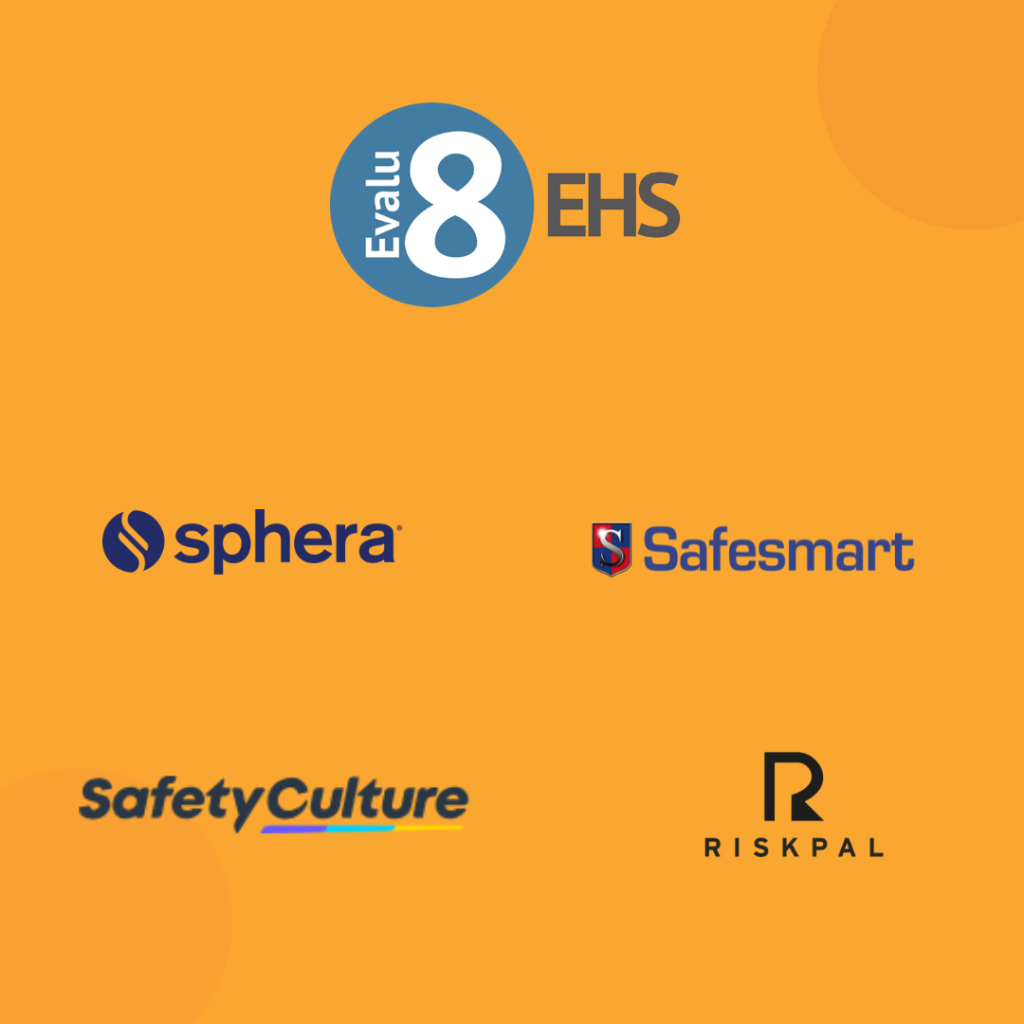
Choosing the right EHS software is critical for UK healthcare providers aiming to maintain compliance, manage clinical risks, and streamline safety procedures. With evolving CQC standards, HSE requirements, and internal quality frameworks, a robust EHS system can transform reactive compliance into proactive risk management. But with so many options, which platform is best for your NHS trust, private clinic, or care home?
In this guide, we compare the top 5 EHS software solutions for UK healthcare and hospitals in 2026, evaluating their features, compliance strengths, and suitability for different care settings. Whether you need a comprehensive all-in-one system, mobile-friendly audit tools, or specialised asset tracking, this list will help you decide with confidence.
Helpful summary
Overview: This article, brought to you by Evalu-8 EHS, presents a detailed comparison of the top 5 EHS software platforms tailored to healthcare and hospital environments in the UK for 2026. It examines core functions, compliance capabilities, pricing approaches, and how each system supports patient-focused safety, infection control, and asset management.
Why trust us: At Evalu-8 EHS, we specialise in modular safety software for UK organisations. We understand the unique challenges of healthcare settings: sharps injuries, COSHH for cleaning agents, manual handling, asset inspections, and CQC-style audits. Our insights reflect real-world needs.
Why it matters: With increasing regulatory scrutiny and high expectations for patient and staff safety, the right EHS platform can reduce incidents, improve audit readiness, and free up clinical teams to focus on care. Choosing wisely now will save time, resources, and ultimately lives.
Action points: Use this guide to match each software’s strengths to your organisation’s size, structure, and compliance goals. Whether you need extensive asset tracking, mobile incident logging, or automated task assignments, you’ll find the fit here.
Evalu-8 EHS: Best All-in-One for Healthcare and hospitals
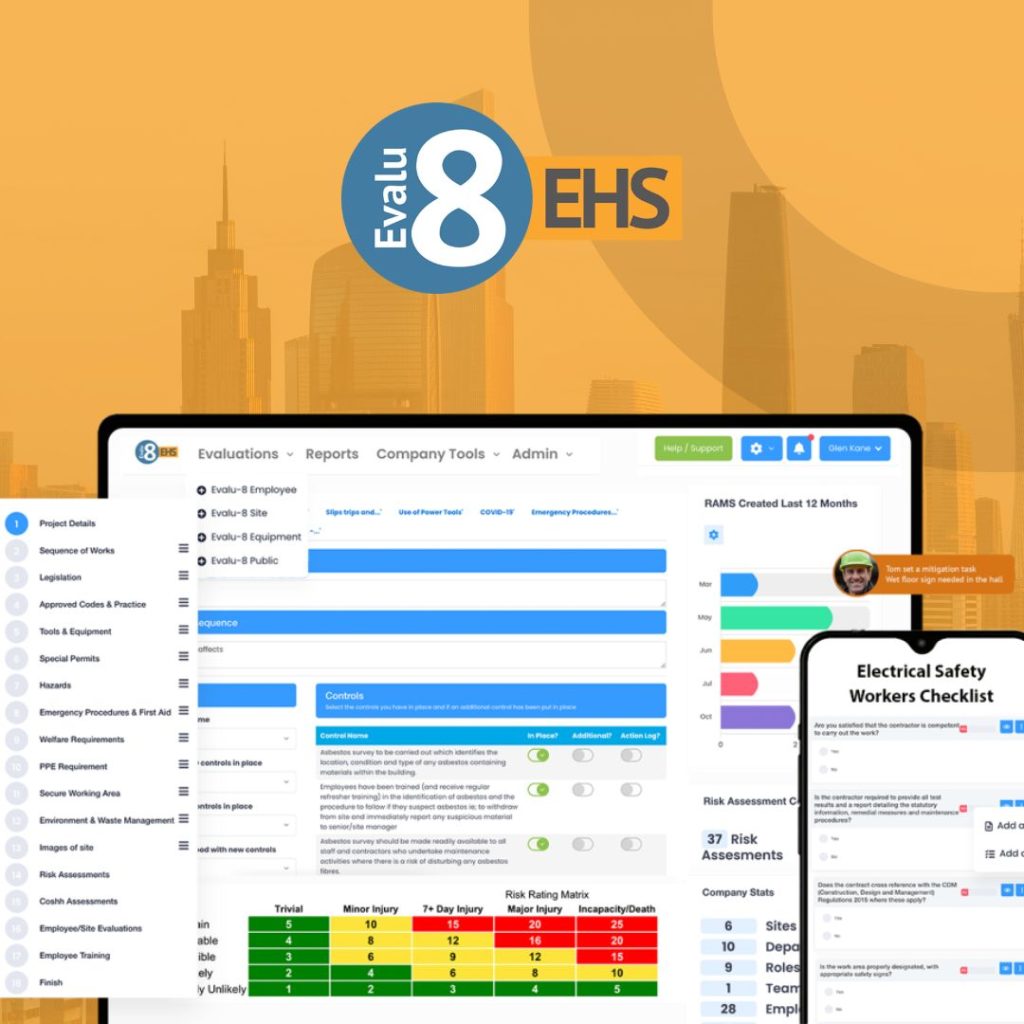
Why Evalu-8 EHS stands out
Evalu-8 EHS is a modular platform built specifically for UK organisations. In healthcare and hospital settings, it centralises patient safety, infection control, and equipment inspections in one place. Small clinics and large NHS trusts alike can pick and pay for only the modules they need, avoiding unnecessary complexity.
Core Features
- Risk assessments: Create and review risk assessments for manual handling, infection risks, violence and aggression protocols.
- RAMS: Generate patient-handling and cleaning protocol RAMS, assign to specific departments with sign-off tracking.
- COSHH management: Store COSHH data for disinfectants, medical gases, and sharps disposal chemicals, with automatic review reminders.
- Asset & equipment management: Schedule hoist inspections, defibrillator maintenance, bed checks, and document outcomes with photo evidence.
- Accident & incident reporting: Log sharps injuries, slips, patient aggression, contamination events via desktop or mobile, with configurable workflows for investigations.
- Audits & inspections: Build CQC-style walkthrough checklists, hand hygiene spot checks, and cleaning audits. Upload photos and assign corrective actions.
- Training management: Maintain a digital training matrix for manual handling, infection control, and COSHH. Track expiry dates and store certificates.
- eSignatures: Enable clinical leads and estates managers to sign off COSHH files, inspection reports, and RAMS packs digitally.
- Mobile app: Ward-based teams can access documents, complete forms, conduct audits, and report incidents on-the-go even offline.
Advanced features
- Document control: Store policies, procedures, and protocols with version control and access permissions.
- Automation & alerts: Assign recurring tasks (e.g. weekly cleaning audits) and receive alerts for overdue inspections or expiring certifications.
- Multi-site management: Group data by ward, department, or facility for oversight across multiple hospitals or care homes.
- Real-time dashboards: Customisable
Explore Evalu-8 EHS
Pros & cons
Pros:
- Fully modular for small clinics up to large trusts
- Centralises patient-focused safety, infection control, and asset tracking
- Mobile app with offline capability for ward-based teams
- Automated alerts for overdue audits, inspections, or training
- Strong UK-based support and regular updates
Cons:
- No built-in eLearning library (SCORM upload only)
- Advanced board-level reporting may require extra setup
Pricing
Evalu-8 EHS follows a modular, pay-as-you-grow model. Core platform access starts at £2.50 per user per month. Additional modules (e.g. RAMS, COSHH, audits) can be added as needed. Pricing scales based on number of user. Request a demo for a custom quote.
SafetyCulture
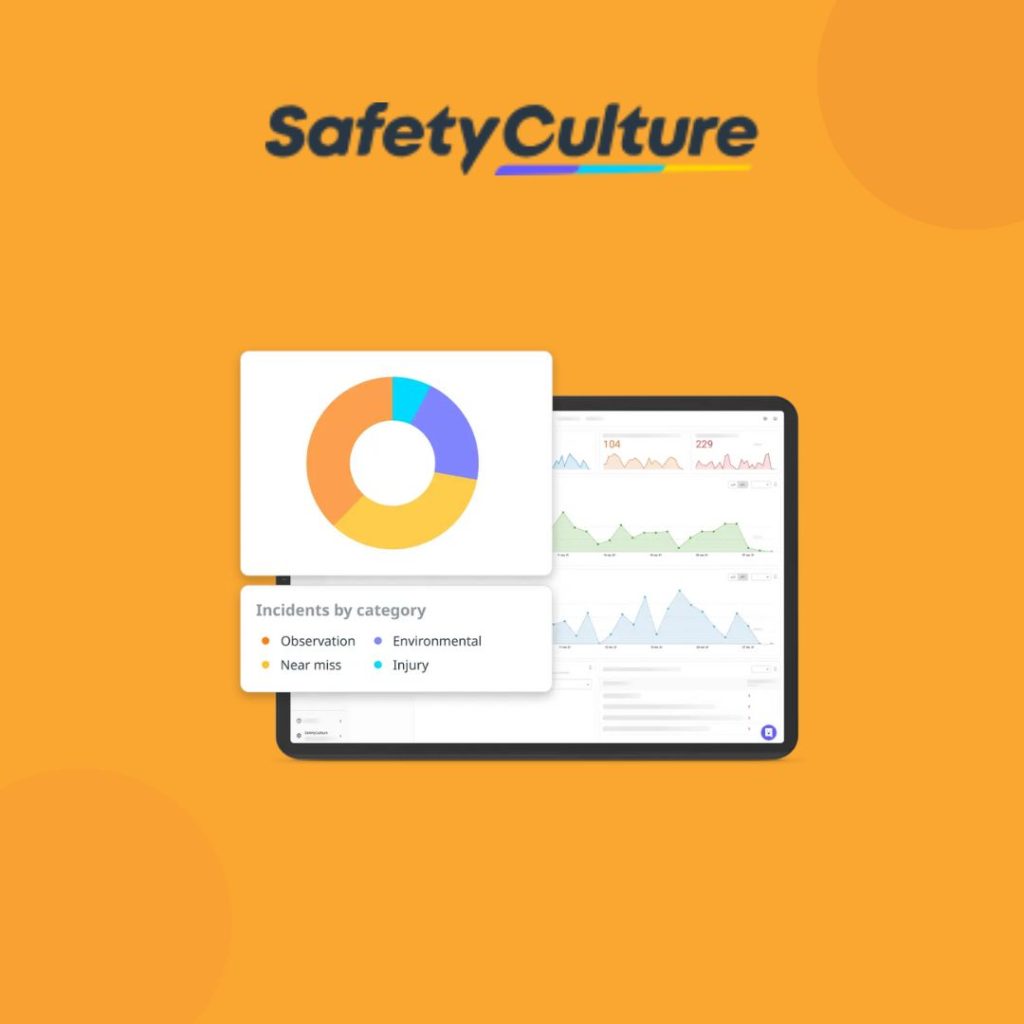
SafetyCulture is a mobile-first platform focused on audits, inspections, and issue reporting. In healthcare settings, it empowers clinical and estates teams to conduct daily safety rounds, hand hygiene audits, and equipment spot checks using intuitive checklists on tablets or smartphones.
Core features
- Inspections and audits: Digitise CQC-style walkthroughs, hand hygiene audits, and environmental cleaning inspections with customisable templates.
- Issue reporting: Staff can report hazards wet floors, missing PPE, faulty hoists in seconds via mobile.
- Analytics & reporting: Real-time dashboards identify trends in infection control breaches or equipment faults.
- Training management: Assign infection control and manual handling courses and track completion.
- Task management: Automatically assign follow-up tasks when an audit fails or an issue is raised.
Advanced features
- Asset management: Track defibrillator checks, bed and hoist maintenance schedules, and ensure compliance with asset service intervals.
- Integrations: Connect with other hospital systems HR, procurement for seamless data flow.
- Customisable templates: Create sector-specific checklists for wards, theatres, or care homes.
Constraints and functionality gaps
- Limited free tier: Free plan covers up to 10 users with five active templates likely insufficient for large trusts.
- Offline functionality: Available but not as robust as some competitors.
- Learning curve: Custom template creation may require initial training.
Pricing
SafetyCulture offers a free tier for up to 10 users. Premium plans begin at £19 per user per month, with unlimited users, templates, advanced analytics, and integrations. Larger organisations can request custom enterprise pricing.
Pros & cons
Pros:
- Mobile-first design ideal for ward rounds and depot inspections
- Real-time issue reporting encourages proactive hazard management
- Customisable checklists align with CQC and HSE standards
Cons:
- Premium pricing can be high for large multi-site trusts
- Offline capability is limited compared to dedicated offline tools
- Requires template setup time and training
Work Wallet

Work Wallet delivers a modular, mobile-focused EHS suite that helps healthcare providers manage incident reporting, risk assessments, and compliance documentation from any device. Its focus on workforce compliance makes it ideal for large hospitals with rotating shifts and temporary staff.
Core features
- Accident & incident reporting: Simplify logging of sharps injuries, patient aggression, slips, and contamination events with configurable categories.
- Audits & inspections: Mobile completion of daily ward safety checks, PPE audits, and cleaning spot checks using customisable templates.
- Risk assessments: Create and review manual handling, lone working, and infection control risk assessments, assigning them to specific roles.
- Safety briefings & toolbox talks: Deliver and track infection control briefings or de-escalation training for staff.
- Digital inductions: Onboard new nurses, agency staff, and contractors with mandatory COSHH and manual handling sign-offs before entry.
Advanced features
- Permit to work: Manage high-risk tasks (e.g. electrical isolation, chemical cleaning) through digital permit workflows.
- Job management: Assign daily cleaning or maintenance tasks, track completion status, and send alerts for overdue actions.
- Contractor gateway: Allow external cleaners or maintenance teams to upload compliance docs (e.g. COSHH certificates) before entering wards.
Constraints and functionality gaps
- Limited integrations: Currently integrates with Azure Active Directory; other integrations may need custom solutions.
- Initial setup: Configuring templates and roles requires planning and training.
- Mobile feature variance: Some advanced reporting functions are desktop-only.
Pricing
Work Wallet starts at £1 per user per month, with modules priced individually. Organisations pay only for features they need, such as incident reporting, audits, or training records. Contact Work Wallet for a tailored quote based on facility size and modules selected.
Pros & cons
Pros:
- User-friendly interface that encourages staff adoption
- Modular design lets hospitals pay only for needed features
- Mobile-first experience for on-ward tasks and incident logging
Cons:
- Limited out-of-the-box integrations beyond Azure AD
- Setup and template creation require time and resources
- Desktop-only for some advanced functions
Evotix
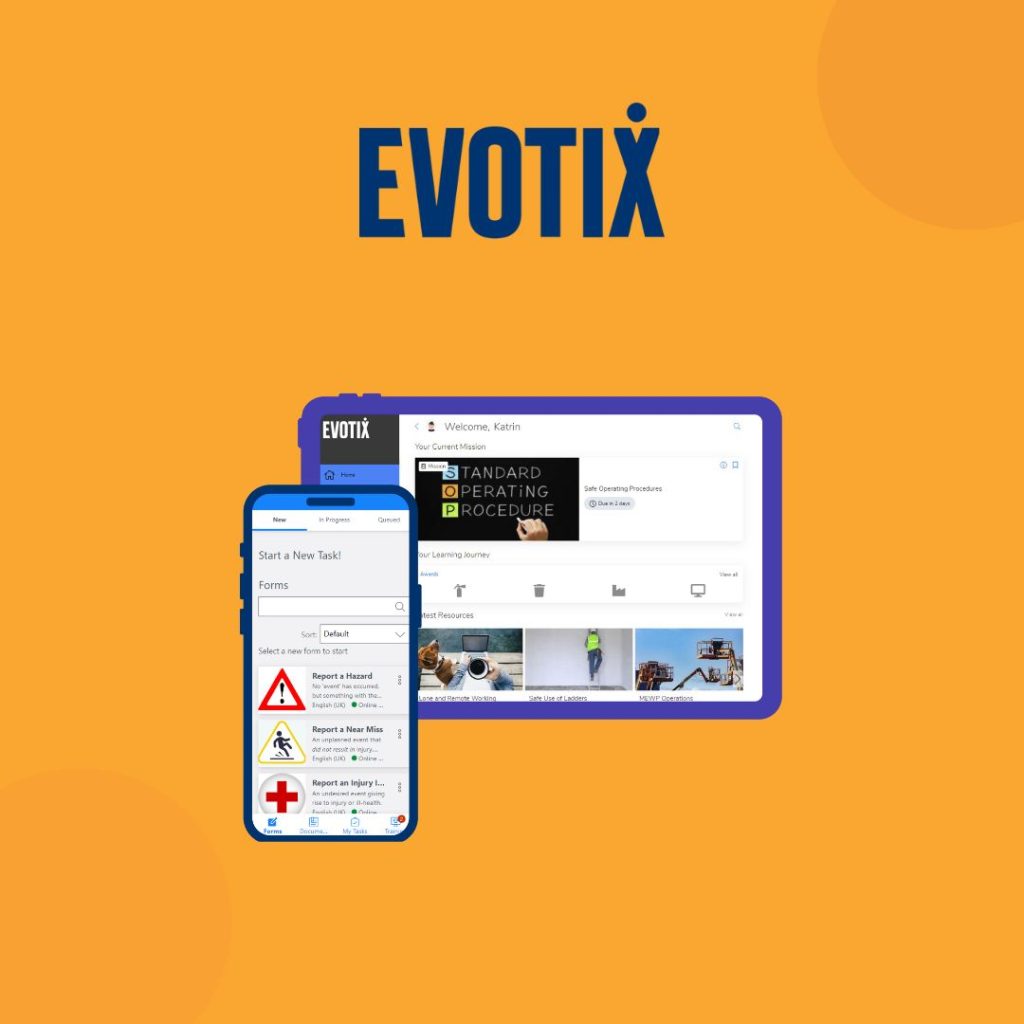
Evotix focuses on fostering a strong safety culture and embedding ESG (environmental, social, governance) metrics into healthcare settings. Its mobile-first design and micro-learning features help clinical and estates teams stay engaged with safety initiatives, from infection control to mental health support.
Core features
- Incident management: Log and investigate sharps injuries, falls, patient aggression, and contamination events with built-in workflows for corrective actions.
- Risk assessment: Identify and mitigate manual handling, infection control, and lone-working risks through interactive assessments.
- Audit & inspection management: Schedule and execute CQC walk-arounds, hand hygiene audits, and equipment spot checks.
- Training management: Create custom, in-app micro-learning modules on infection control, de-escalation techniques, and COSHH protocols.
- Document management: Store and retrieve policies, RAMS packs, COSHH files, and inspection checklists securely.
Advanced features
- ESG reporting: Track sustainability initiatives waste reduction, energy usage in hospitals, and social governance metrics like staff well-being.
- Occupational health & industrial hygiene: Monitor exposure to cleaning chemicals, sharps handling, and noise levels in theatres.
- Operational risk management: Evaluate and mitigate risks to patient and staff safety across clinical and support functions.
- Customisable dashboards & reporting: Real-time analytics on incident trends, audit compliance, training gaps, and ESG performance.
Constraints and functionality gaps
- Learning curve: Extensive features may require dedicated training for full adoption.
- Customisation limitations: Some modules may need extra configuration to fit specific hospital workflows.
- User interface: Certain processes can feel complex, indicating room for UX improvements.
Pricing
Evotix employs a bespoke pricing model based on organisation size, module selection, and support level. Contact Evotix for a custom quote aligned with your facility’s EHS and ESG goals.
Pros & cons
Pros:
- Strong mobile-first approach engages frontline staff with micro-learning and incident reporting
- Robust ESG and occupational health features support sustainability goals
- Custom dashboards provide clear visibility into safety culture metrics
Cons:
- Higher complexity may require more training resources initially
- Bespoke pricing can be a barrier for smaller clinics without defined budgets
- Some processes may feel overwhelming for teams new to digital EHS
Cority

Cority is a comprehensive EHS platform designed for large healthcare organisations requiring advanced workflows, deep analytics, and extensive integration capabilities. It suits large NHS trusts, private hospital chains, and care home groups with multi-site operations and intricate compliance demands.
Core features
- Occupational health management: Manage employee health records, medical surveillance, and return-to-work protocols for clinical and non-clinical staff.
- Safety management: Facilitate incident reporting, risk assessments, and safety audits to ensure a safe environment for patients and staff.
- Environmental management: Track waste disposal, chemical usage, and compliance with environmental regulations in hospitals.
- Industrial hygiene: Monitor exposures to cleaning agents, sharps hazards, and noise in operating theatres.
- Ergonomics: Evaluate and mitigate ergonomic risks in wards, kitchens, and offices to reduce staff musculoskeletal disorders.
- Training management: Centralise training requirements for manual handling, infection control, and CQC compliance.
- Document control: Store policies, procedures, and forms with rigorous version control and access permissions.
Advanced features
- Mobile solutions: Allow staff to complete inspections, report incidents, and review RAMS on any device online or offline.
- Data visualisation: Graphical dashboards illustrate incident hotspots, compliance gaps, and training status across multiple sites.
- Risk management: Identify, evaluate, and mitigate risks associated with patient care, laboratory work, and waste handling.
- Inspection management: Schedule and track preventive maintenance for assets hoists, defibrillators, HVAC systems and ensure timely corrective actions.
- Configurable workflows: Tailor existing workflows to reflect hospital-specific approval chains, infection control protocols, and audit processes.
Constraints and functionality gaps
- Pricing transparency: Cority’s pricing is not publicly disclosed, requiring direct engagement for tailored quotes.
- Learning curve: Its extensive feature set demands substantial training and onboarding for full utilisation.
- Integration capabilities: While robust, integrations with legacy NHS systems (PAS, EPR) may require bespoke development.
Pricing
Cority offers a customised pricing model based on the number of users, modules selected, and integration complexity. Large trusts and hospital chains are encouraged to contact Cority directly for a tailored proposal aligned with their EHS strategy.
Pros & cons
Pros:
- Comprehensive modules cover all aspects of healthcare EHS, from occupational health to environmental management
- Mobile-enabled for on-the-go incident reporting and inspections
- Powerful analytics and dashboards support data-driven decision-making
Cons:
- High complexity and steep learning curve require dedicated training resources
- Upfront cost and integration effort can be significant for large organisations
- Implementation timelines may be extended due to bespoke workflow configuration
Choosing the best EHS software for your healthcare organisation
In healthcare and hospital settings, patient safety and regulatory compliance are paramount. While each EHS platform offers unique strengths, Evalu-8 EHS stands out as a fully modular, mobile-friendly software tailored to UK providers covering RAMS, COSHH, asset management, and infection control audits all in one place.
Assess your organisation’s size, complexity, and budget to select the software that aligns with your clinical safety goals and compliance requirements. Whether you need a lightweight audit tool or a fully integrated enterprise system, this guide will help you find the right EHS software to enhance patient and staff safety in 2026.
FAQs
Healthcare providers should prioritise incident and sharps injury reporting, COSHH management for cleaning agents and medical gases, asset and equipment inspection scheduling (e.g., hoists, AEDs), infection control audits, and digital RAMS for patient handling.
Many modern EHS platforms offer APIs or native integrations with electronic health records (EHR), facilities management systems, and HR databases. This ensures seamless data flow for incident tracking, training records, and maintenance logs. Be sure to confirm integration capabilities during vendor evaluation.
EHS solutions automate audit and inspection workflows according to CQC and HSE standards, provide digital record-keeping for COSHH and infection control, and generate compliance reports. Automated reminders and dashboards help demonstrate adherence during inspections and reduce manual paperwork.
Yes. Mobile-friendly EHS software enables clinical and estates teams to log incidents, complete audits, and sign off COSHH and RAMS directly from ward-side devices or smartphones. Offline capabilities ensure data capture even in areas with poor connectivity, improving real-time compliance.
Most NHS trusts and private clinics see a return on investment within 6–12 months through reduced incident rates, faster audit turnaround, fewer compliance fines, and decreased administrative overhead. Real-time dashboards and automated tasks accelerate savings by highlighting risks before they escalate.
